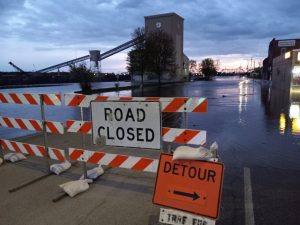UI studies why qualified homeowners reject loans to rebuild after disasters
September 2nd, 2024 by Ric Hanson
(Radio Iowa) – A University of Iowa study finds a significant number of homeowners who qualify for low-interest government loans to rebuild after a disaster choose not to apply, or they reject the loan after they’re approved. Finance Professor Cameron Ellis, in the U-I’s Tippie College of Business, says they’ve done extensive research on people’s post-disaster borrowing habits dating back nearly 20 years, and the loans are an excellent opportunity. “Oftentimes they’re lower than Treasury rates, the government can’t even borrow at these interest rates,” Ellis says. “And it’s not even just people who don’t apply. It’s people who do apply and go through the application process decline the loan after learning more about it. It’s very odd, because there’s not a private alternative that would even come close to being as good of a deal.”
The study looked at loan activity following every natural disaster between 2005 and 2018, including the 2008 Iowa floods, hurricanes like Katrina and Harvey, Superstorm Sandy, and numerous western wildfires. Ellis says some people just have an aversion to going into debt, especially when the federal government is involved. “Most people’s experience borrowing money from the government comes through student loans, which, student loans are famously survived through bankruptcy. You almost always will pay back your student loans unless you get a hardship exemption,” Ellis says. “These loans are not like that. People don’t realize that they’re just like a normal loan, like a mortgage you would get where, if you go bankrupt, it’s discharged. You’re not stuck with it forever.” 
The administrator of the U-S Small Business Administration was in Iowa recently to visit the town of Greenfield, which was hit by a major tornado in May. Part of the trip was dedicated to educating people about the S-B-A’s loan programs to help businesses, homeowners and renters rebuild after a disaster. The U-I study found about 25-percent of people who qualified for such loans rejected them, or didn’t bother to apply. Ellis says some people get jumpy over interest rates, when they shouldn’t be. “When the interest rate goes up by, say, one percentage point, and the average interest rate in the program over our timeframe, going back to Katrina, is about two and a half percentage points. If it goes up by one percentage point, acceptance goes down by another 25%,” Ellis says. “Maybe it’s some debt aversion reasons why people would just decline at all. But it’s very odd that they’re so sensitive to interest rates, even though they’re a much better deal than you would get elsewhere.”
Ellis says more than one-million households -did- apply for loans during the period the U-I studied, and more than 12-billion dollars was dispersed to more than 285-thousand approved households. Ultimately, Ellis says fewer participants puts more financial pressure on homeowners, and slows the pace of disaster recovery for individuals and the community.





